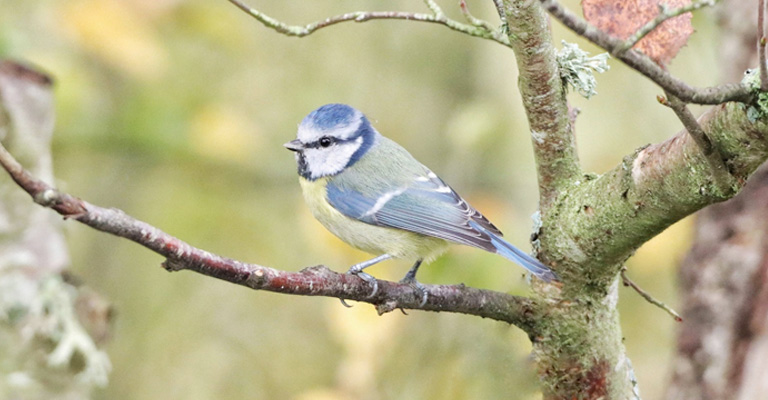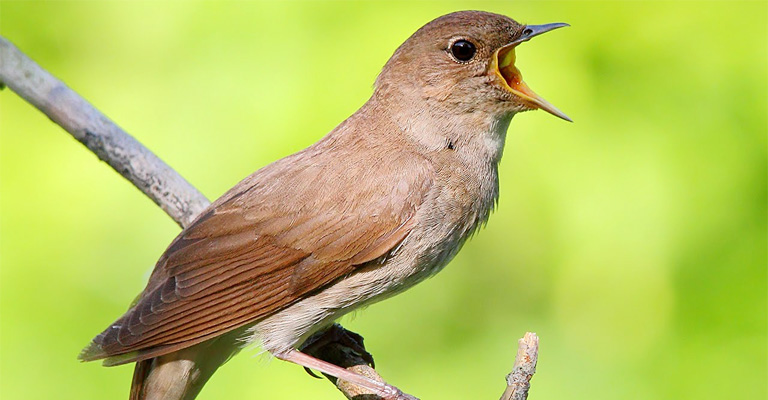The harmonious melodies of birds and the natural world have a profound impact on our mental well-being. For centuries, humans have found solace in the songs of birds, and science now confirms what our instincts have long intuited – that the avian symphony offers tangible benefits for our mental health.
This synergy between humans and birds reflects our deep-rooted connection with nature, a connection that is increasingly vital in today’s fast-paced, urbanized world.
As we explore the reasons why birds and their songs are good for our mental health, we delve into the soothing effect of bird songs, the mindfulness they encourage, and the sense of wonder they inspire.
This journey also highlights the role of birds in reducing stress, enhancing mood, and fostering social connections. Together, these facets underscore the therapeutic value of bird songs, illuminating the pathways through which they contribute to our mental and emotional well-being.

Why Birds And Their Songs Are Good For Our Mental Health?
Birds and their songs have been found to have a positive impact on our mental health in various ways. Here are some correlations explaining why they are beneficial:
Connection To Nature
Birds and their songs connect us to nature, offering a sense of belonging and tranquility. The presence of natural elements has been linked to reduced stress and increased feelings of well-being.
Mindfulness And Present Moment Awareness
Listening to bird songs encourages mindfulness, helping individuals focus on the present moment. This practice is associated with reduced anxiety and improved mental clarity.
Stress Reduction
The calming effect of bird songs can significantly reduce stress levels. The rhythmic and melodious tunes create a soothing ambiance, promoting relaxation and lowering the production of stress hormones.
Positive Distraction
Bird songs act as a positive distraction, diverting attention away from negative thoughts or worries. This diversionary tactic is often used in cognitive behavioral therapies to alleviate symptoms of anxiety and depression.
Enhanced Mood
The cheerful melodies of birds can elevate mood and trigger the release of neurotransmitters like dopamine, which are associated with pleasure and happiness. This boost in mood can counteract feelings of sadness or low energy.
Social Connection
Birdwatching and sharing observations of different bird species create opportunities for social interactions. Engaging in such communal activities fosters a sense of belonging, reducing feelings of loneliness and isolation.
Physical Activity
Birdwatching often involves outdoor activities, encouraging individuals to spend time in nature and engage in physical exercise. Physical activity is well-known for its positive effects on mental health, including the reduction of anxiety and depression symptoms.
Symbolism And Inspiration
Birds and their songs are often symbolic of freedom, hope, and inspiration in various cultures. The symbolism associated with birds can inspire individuals, giving them a sense of purpose and motivation, which are vital for mental well-being.
Cognitive Benefits
Identifying different bird species and their songs sharpens cognitive skills such as attention, memory, and problem-solving.
Engaging in these mental exercises stimulates the brain and can be especially beneficial for individuals dealing with cognitive decline or mood disorders.
Incorporating these elements into daily life, such as listening to bird songs during a walk in the park or joining a birdwatching group, can contribute significantly to improved mental health and overall well-being.
What Kind Of Music Do Birds Sing?

Birds produce a wide variety of songs and calls, each with its unique characteristics and purposes. Here are the types of bird songs:
Sparrow’s Chirping
Sparrows are known for their cheerful and rapid chirping. Their songs are often composed of short, repetitive notes, creating a lively and energetic ambiance in gardens and urban areas.
Robin’s Melodic Warble
The American Robin produces a melodious warble that consists of clear, flute-like notes. Their song is a sign of spring and is associated with a sense of renewal and hope.
Mourning Dove’s Coos
Mourning doves produce soft, mournful coos that evoke a sense of serenity and tranquility. These gentle sounds are often heard in suburban and rural environments.
Nightingale’s Night Serenade
Nightingales are renowned for their powerful and complex songs, typically delivered during the night. Their melodious trills and warbles are often associated with the beauty of the night and have inspired poets and musicians for centuries.
Canary’s Lyrical Tunes
Canaries are famous for their clear and musical songs. They produce a wide range of notes, often in a structured and rhythmic pattern. Canary songs are prized for their beauty and have been bred for centuries for their singing abilities.
Mockingbird’s Imitations
Northern Mockingbirds are gifted mimics, incorporating a variety of other bird species’ calls into their songs. They create a diverse and ever-changing symphony, showcasing their ability to imitate the sounds of their environment.
Whippoorwill’s Repetitive Call
Whippoorwills are known for their distinctive “whip-poor-will” call, repeated continuously during the night. This repetitive song is evocative of warm summer evenings and rural settings.
Song Sparrow’s Musical Variations
Song Sparrows produce a series of melodious notes with variations. Their songs are often used for territorial defense and courtship, and they can adapt their tunes to local dialects.
Cockatoo’s Playful Vocalizations
Some species of Cockatoos, such as the Sulphur-crested Cockatoo, are not known for their singing but are prized for their playful and vocal personalities. They can mimic human sounds and engage in interactive vocal exchanges with their owners.
Each bird species has its unique song, reflecting its evolutionary history, habitat, and behavioral needs. Bird songs enrich our natural surroundings and provide a delightful auditory experience, connecting us to the diverse avian world.
Which Bird Sings Well?

Many birds are renowned for their beautiful and melodious songs, captivating the hearts of birdwatchers and nature enthusiasts worldwide.
Here are some birds celebrated for their exceptional singing abilities:
Nightingale (Luscinia Megarhynchos)
The Nightingale’s song is often considered one of the most enchanting in the bird world. It combines a rich, flute-like melody with intricate trills and runs, creating a captivating night serenade.
Song Sparrow (Melospiza Melodia)
Song Sparrows are known for their diverse and melodious songs. They incorporate a variety of notes and variations, making each individual’s song unique. Their songs are often heard in gardens and along waterways.
American Robin (Turdus Migratorius)
The American Robin’s song is a clear, cheerful warble that heralds the arrival of spring in many regions of North America. Its melodious notes evoke feelings of renewal and hope.
European Blackbird (Turdus Merula)
Blackbirds, especially males, produce a captivating and flirty song with a range of melodious notes. Their songs are often heard in European gardens and woodlands.
Canary (Serinus Canaria)
Canaries are famous for their lyrical and structured songs. They sing with clear, high-pitched notes and have been cherished as cage birds for their musical abilities.
Eastern Bluebird (Sialia Sialis)
Eastern Bluebirds are known for their sweet and melodious warbles. Their songs are a common sound in open woodlands and fields across eastern North America.
Mockingbird (Mimus Polyglottos)
Northern Mockingbirds are exceptional mimics, incorporating the songs of various other birds into their repertoire. Their diverse and ever-changing melodies are a testament to their vocal versatility.
Eastern Meadowlark (Sturnella Magna)
Meadowlarks are celebrated for their clear, flute-like songs. They often sing from prominent perches in grasslands and are a symbol of North American prairies.
European Skylark (Alauda Arvensis)
Skylarks are known for their soaring and continuous songs, delivered while hovering high above open fields. Their melodic tunes are associated with the beauty of the countryside.
Each of these birds showcases its unique singing talents, contributing to the rich tapestry of avian melodies across the world. Whether for territorial defense, courtship, or sheer beauty, their songs bring joy and wonder to those who have the privilege of listening.
FAQs
How do bird songs benefit our mental health?
Bird songs have a calming effect on our minds. Listening to their melodious tunes promotes relaxation, reduces stress, and lowers the production of stress hormones like cortisol.
This calming influence helps alleviate anxiety, improves mood, and contributes to an overall sense of well-being.
Can bird songs help with mindfulness?
Yes, absolutely. Bird songs encourage mindfulness by drawing our attention to the present moment. When we focus on these natural sounds, it helps us stay grounded and mindful, reducing rumination and promoting mental clarity.
Do bird songs enhance our mood?
Yes, they do. Bird songs can trigger the release of dopamine, a neurotransmitter associated with pleasure and happiness. Their cheerful melodies can elevate our mood, counteract feelings of sadness, and increase our overall sense of positivity.
How can birdwatching and bird songs foster social connection?
Birdwatching often involves group activities or sharing observations with others. This creates opportunities for social interactions, fostering a sense of belonging and reducing feelings of loneliness and isolation.
Are there cognitive benefits to listening to bird songs?
Yes, engaging with bird songs can sharpen cognitive skills such as attention, memory, and problem-solving.
It stimulates the brain, making it beneficial for individuals dealing with cognitive decline and mood disorders like depression. Bird songs offer a natural and enjoyable way to exercise our mental faculties.
Conclusion
In the modern age, where the demands of daily life can be overwhelming, the simple beauty of bird songs offers a lifeline to serenity.
This symphony from nature’s orchestra acts as a reminder of our intrinsic ties to the natural world, grounding us in the present moment and soothing our anxious minds.
As we conclude our exploration of why birds and their songs are good for our mental health, it becomes evident that this age-old connection has profound implications for our well-being.
Birds and their songs provide a powerful antidote to the stresses of contemporary living, inviting us to pause, breathe, and embrace the therapeutic benefits of nature’s melodies.
By fostering mindfulness, reducing stress, and promoting social connection, bird songs offer a harmonious refuge for our minds and a timeless reminder of the restorative power of the natural world. In their songs, we find solace, hope, and a melody of healing for our souls.